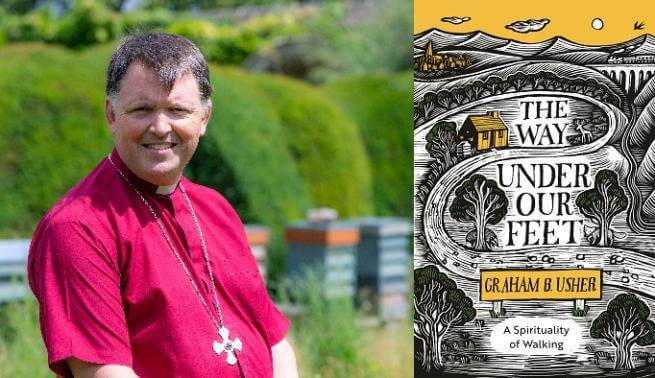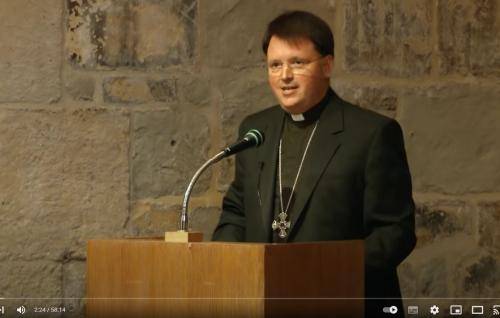Listening to the Voice of Creation
Listening to the Voice of Creation
Bishop Graham Usher reflects on how we can listen to the Voice of Creation in a time of climate change.
1. The Glorious Song of Creation
During the height of pandemic lockdowns many experienced their local environment to be quieter. I heard people say that they could hear birds singing for the first time in their street and noticed the different sounds of wind in the leaves of different trees. It was as if each tree had a different signature tune to play.
We are in the Season of Creation, an ecumenical season from 1st September, the World Day of Prayer for the Care of Creation, until the Feast of St Francis of Assisi on 4th October. Originally designated by the Ecumenical Patriarch, it is a time to be united in prayer and protection of our single island planet home.
Each year Christians unite around a theme. This year we are encouraged to “Listen to the Voice of Creation”.
Might we hear, in the midst of the three-fold assault on the environment - climate change, biodiversity loss and pollution – the cry of creation? The groaning of so many species and habits that are endangered, and, through time, the echo of that genetic pool that has breathed its last and already become extinct.
Creation has cried aloud in pain as fires have licked through forests, rivers have dried up, and pollution has choked lungs and hidden the sun from view.
The Psalmist (19.1-4) declares:
The heavens are telling the glory of God, and the firmament proclaims his handiwork.
Day to day pours forth speech, and night to night declares knowledge.
There is no speech, nor are there words; their voice is not heard;
Yet their voice goes out through all the earth and their words to the end of the world.
To listen to ‘their voice’ takes a special tuning in. It takes putting away self-interest, profit, greed and power. Then we might just hear that we humans are a mere small part of the diverse and glorious song of creation which tells of the mystery of God.
Lord, hear our prayer sung in a greater company of living things.
2. Now Is The Time
During the pandemic, as we sat too often within a sea of little boxes on the screen of our computer, many of us were told, “You’re muted”. We’ve needed to learn how to unmute ourselves. In the current climate and biodiversity emergencies that the world faces, it can seem as if the voice of people most affected has been muted.
The Lambeth Conference was for me an important time of truth-telling through storytelling. I was enriched reading the scriptures with people from widely different contexts and experiences. Many spoke about environmental concerns. The bishop of Vanuatu, in the South Pacific, pleaded with me, saying, “My islands are sinking, but no one is listening. You need to hear me.”
When are we truly listening to the voices of generational wisdom, to those who are already impacted by loss and damage? “Listen to advice and accept instruction” writes the author of Proverbs (19.20), “that you may gain wisdom for the future.”
The loss of human cultures, of locality and knowledge, as places become salinated, flooded, polluted or too hot to live in, is happening at an unprecedented rate. It will create millions more people who are either internally displaced or are forced to become refugees.
We need to be listening to the cries from around the world and insist that governments also listen and act. There is much hype around COP meetings, as there will be with COP27 in Egypt. It is easy for governments to make pledges on world stages. Rarely are they followed through. Every excuse is offered, every delaying tactic employed. But now is the time to hold our collective feet towards the burning fires of the world.
Lord, hear our prayer and enable us to listen to the wisdom of the ages that cares for the Earth and to take into our prayer the cry we hear from the most vulnerable.
3. The Joyous Song of Bees
Listening is different to hearing. It is easy to tune out. Listening takes attention.
My bees are now beginning to settle down for their winter hibernation, clustering in a big football shape in the heart of the hive. During the late spring and early summer, I must check them every week to ensure that they are not creating a new queen. It’s the emergence of a new queen that results in a neighbour-annoying swarm, as well as a depleted hive producing less honey.
Beekeepers can tell a lot from the sound the bees are making, especially whether they are content or mighty angry. The sound of happy bees is a joyous song! The key thing about being a beekeeper is to be as relaxed as you can be. The bees know if you’re stressed, probably because you handle them differently, and that seems to churn them up.
So, I often speak to my bees, telling them news, explaining what I’m doing to and for them, though I’m careful not to tell them when I’m taking their honey stores as it takes one bee its entire life to produce just a 1/12 of a teaspoon of honey. There are also times of silence, of careful watching and waiting. It can be contemplative and prayer-filled.
Listening to the voice of creation involves hearing the harmonies of the natural world, of slowing down, and entering a liminal space in which we can glimpse a deeper present and a different future. It is the beginning of what Jürgen Moltmann called “a discernment of God who is present in creation, who through his Holy Spirit can bring men and women to reconciliation and peace with nature”.
Lord, hear our prayer to work for the reconciliation of our wounded planet, held in you.
4. Wonder
The climate and biodiversity crises can seem so enormous that we wonder what on earth we can really do to make a difference.
When Neil Armstrong first went into space, he looked out of the window of the Apollo spaceship and he recalled later how, “It suddenly struck me that that tiny pea, pretty and blue, was the Earth. I put up my thumb and shut one eye, and my thumb blotted out the planet Earth. I didn't feel like a giant. I felt very, very small.”
Seeing earth from space changed the way we think about ourselves. This beautiful blue planet looks different to any other. It fills us with wonder. It is, in the words of the first chapter of Genesis, “very good”. Yet it is also so very fragile.
Seeing creation’s loveliness, goodness and beauty might just re-kindle the foundation for a life-affirming, world-affirming horizon for our relationship with creation, rather than the world-denying, world-denigrating, world-escaping approach that we can be complicit in.
Wonder reminds us of the essential worth of creation. It takes us out of our own frame of self-concern and reminds us that we are a small part of a much larger whole, yet with the proven ability to be creation’s greatest threat. It shapes our co-responsibility for creation’s future.
Might Jesus, in saying “look at the birds of the air” and “consider the lilies of the field” be fostering the virtues of humility and what to value within us? Is he asking us to approach the world more like a toddler, excited by colour and texture and taste, and discovering that there is ever more to discover?
Lord, hear our prayer that
“When through the woods and forest glades I wander,
I hear the birds sing sweetly in the trees,
When I look down from lofty mountain grandeur
And hear the brook and feel the gentle breeze,
Then sings my soul, my Saviour God, to thee –
How great thou art!”






